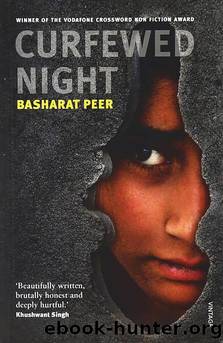bok 1601898409 by Basharat Peer

Author:Basharat Peer
Language: eng
Format: epub
Chapter Ten
Prague had protested and won; Berlin had protested and won; Kashmiris too had believed that our protests would win Kashmir its freedom. The early nineties were a naive, heady time. But Kashmiri demonstrations faded out after the massacres of protesters. I often think the conflict might not have turned so fatal if India had allowed those peaceful demonstrations. Maybe those demonstrations and not the armed militancy would have become the dominant aspect of politics in Kashmir, maybe Indians and Kashmiris could have talked and thousands of deaths might have been avoided. But that did not happen. Instead, firing on protesters, arrests, disappearances, custodial killings, kidnappings, assassinations, and torture dominated Kashmir. In a prose poem, Agha Shahid Ali wrote: The doctor who treated a sixteen year old boy Recendy released from an interrogation centre asked, 'Why didn't the fortune tellers predict The lines in his palms would be cut by a knife?' I had come close to being the boy in Shahid's poem, one day in the winter of 1992, when there was a military crackdown on our village. I remember the cries of the boys, including my neighbour's son Manzoor, who were being tortured in the rooms next to mine. In November, a few days after Ramadan I crossed Zero Bridge and continued past the old Radio Kashmir building on a rather quiet road. Old buses waited outside the elite Burn Hall boys school; supplicants with applications hung around the dropgates of government ministers' much- guarded mansions; and the leafless chinar branches hung over
empty stands of the cricket stadium. I crossed another road and found myself facing a colonial mansion painted blue and white. A plaque on its gate read: United Nations Military Observer Group for India and Pakistan. The old mansion and the UN mission both seemed hapless reminders of a lost time. The architecture of the mansion was a dying style, which blended the Kashmiri use of woodwork with British sensibilities; the UN resolutions on Kashmir, recommending a plebiscite, lived as hollow quotations in books and journals. A short walk from the UN office, Gupkar Road is a well- bunkered and well-patrolled neighbourhood. Senior politicians, bureaucrats, and intelligence operatives live here in lovely houses with high, ugly walls and stern guards. Gupkar is our Green Zone. The road turns towards Grand Palace, the palace of Hari Singh, the last monarch of Kashmir. During the nineties, most people dreaded Gupkar Road. It was the road to Papa-2. Papa-2 was the most infamous torture centre run by the Indian forces in Kashmir. Originally, it was a large mansion built by Hari Singh, which was later converted into a guesthouse and known as the Fairview Guest House. Hundreds who were taken to Papa-2 did not return. Those who returned were wrecks. The detention cum torture centre was closed down in the late nineties. A top government official got the Papa-2 building renovated and turned it into his residence. Before moving in, the Oxford-educated officer called priests of all religions
Download
This site does not store any files on its server. We only index and link to content provided by other sites. Please contact the content providers to delete copyright contents if any and email us, we'll remove relevant links or contents immediately.
Day by Elie Wiesel(2241)
The Age of Genius by A. C. Grayling(2173)
Gideon's Spies: The Secret History of the Mossad by Gordon Thomas(1950)
The Gulag Archipelago (Vintage Classics) by Aleksandr Solzhenitsyn(1725)
FATWA: Hunted in America by Pamela Geller(1720)
Columbine by Dave Cullen(1495)
Examples & Explanations: Administrative Law by William F. Funk & Richard H. Seamon(1325)
The Rule of Law by Bingham Tom(1318)
Men Explain Things to Me by Rebecca Solnit(1312)
Anatomy of Injustice by Raymond Bonner(1268)
Three Cups of Tea by Greg Mortenson(1256)
ADHD on Trial by Michael Gordon(1238)
That Every Man Be Armed by Stephen P. Halbrook(1236)
Gideon's Spies by Gordon Thomas(1213)
Palestinian Walks by Raja Shehadeh(1141)
The Source by James A. Michener(1133)
Fast Times in Palestine by Pamela Olson(1115)
Nothing to Envy by Barbara Demick(1040)
Constitutional Theory by Carl Schmitt(1034)
